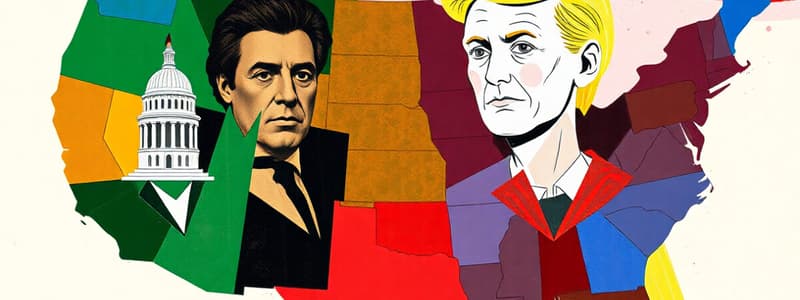Podcast
Questions and Answers
Which of the following are principles of the Constitution? (Select all that apply)
Which of the following are principles of the Constitution? (Select all that apply)
- Separation of Powers (correct)
- Popular Sovereignty (correct)
- Checks and Balances (correct)
- Divine Right of Kings
The Bill of Rights comprises the first ten amendments to the Constitution.
The Bill of Rights comprises the first ten amendments to the Constitution.
True (A)
What is the main purpose of the Declaration of Independence?
What is the main purpose of the Declaration of Independence?
To declare the American colonies' independence from British rule.
The __________ process is the mechanism by which a legislative bill becomes law.
The __________ process is the mechanism by which a legislative bill becomes law.
Match the branches of government with their primary functions:
Match the branches of government with their primary functions:
What are considered obstacles to African American voting historically?
What are considered obstacles to African American voting historically?
The Necessary and Proper Clause allows Congress to make laws that are explicitly stated in the Constitution only.
The Necessary and Proper Clause allows Congress to make laws that are explicitly stated in the Constitution only.
Name one advantage of the two-party system.
Name one advantage of the two-party system.
Flashcards
Checks and Balances
Checks and Balances
The principle that each branch of government has the power to limit the actions of the other branches, preventing any one branch from becoming too powerful.
Bill of Rights
Bill of Rights
The first ten amendments to the Constitution, guaranteeing basic rights and freedoms to all citizens.
Three Branches of Government
Three Branches of Government
A system where the government is divided into three branches: the legislative branch (Congress), the executive branch (President), and the judicial branch (Supreme Court).
Impeachment Process
Impeachment Process
Signup and view all the flashcards
Presidential Actions on Legislation
Presidential Actions on Legislation
Signup and view all the flashcards
Necessary and Proper Clause
Necessary and Proper Clause
Signup and view all the flashcards
Presidential Roles
Presidential Roles
Signup and view all the flashcards
Two-Party System
Two-Party System
Signup and view all the flashcards
Study Notes
American Government Study Guide
- Government and its purposes: Understanding the Preamble to the Constitution and different types of governments with examples
- Declaration of Independence: Key principles of the declaration
- Principles of the Constitution: Focus on checks and balances of the three branches of government with examples
- Articles of Confederation: Overview of this historical document
- Bill of Rights: General understanding of the Bill of Rights
- Additional constitutional amendments: Key amendments and their significance
- Two-Party System: Explanation of the two-party system in the US and why it exists, its advantages and disadvantages
- Types of minor parties: Description and examples of minor political parties
- Political spectrum: Understanding the spectrum with examples of liberalism and conservativism
- Electorate: Understanding how and why the electorate has changed historically
- Elections and voting terms/concepts: Key terms and concepts related to voting
- Obstacles to African American voting: Historical and contemporary obstacles faced
- Terms and constitutional requirements: Requirements and terms for Senators, House members, and the president
- Impeachment process: Steps and procedures for impeachment
- Congressional leaders: State and national Congressional leaders
- Necessary and proper clause: Explanation of the clause
- Implied vs. expressed powers: Difference between the two types of powers, with strict vs. liberal interpretations
- Roles of the president: Different roles of the president
- How a bill becomes a law: Steps in the legislative process
- POTUS options on a proposed law: Options for a president on proposed legislation
- Succession of the president: Process in case of presidential vacancy
- Duties of the Vice President: Responsibilities and actions of the Vice President
- Basics of Supreme Court: Fundamental principles and practices of the Supreme Court
Studying That Suits You
Use AI to generate personalized quizzes and flashcards to suit your learning preferences.




